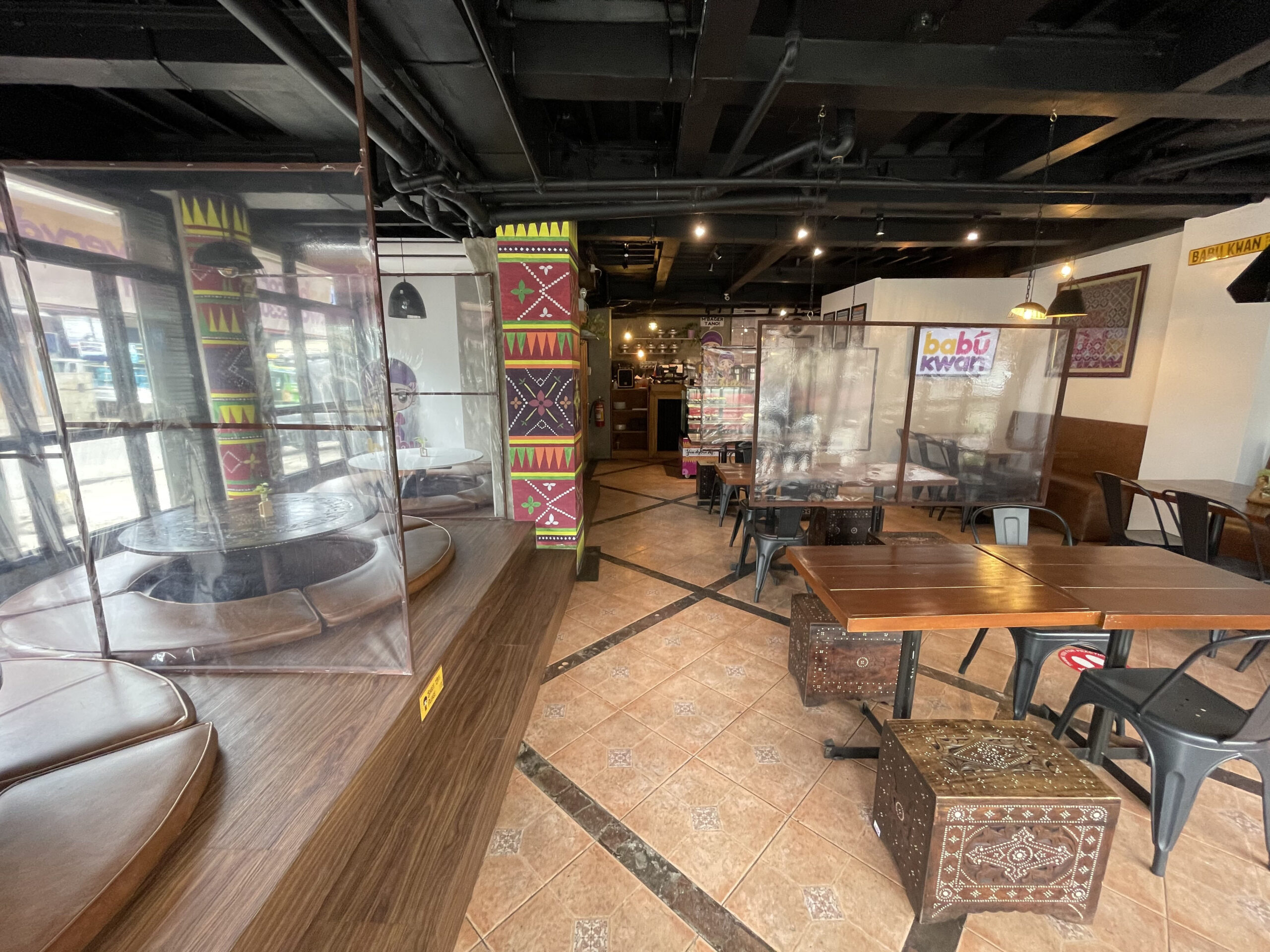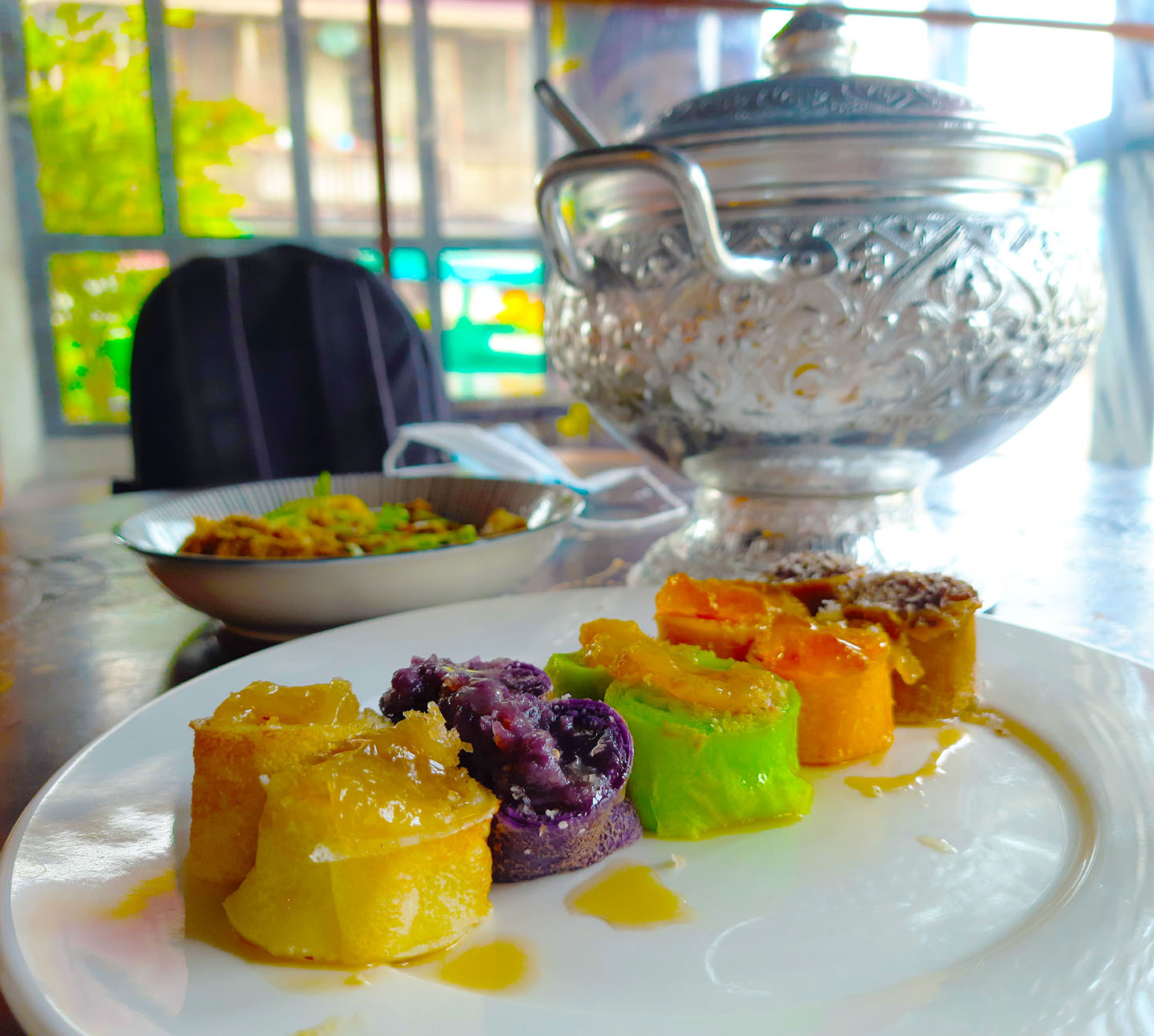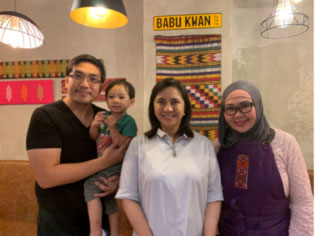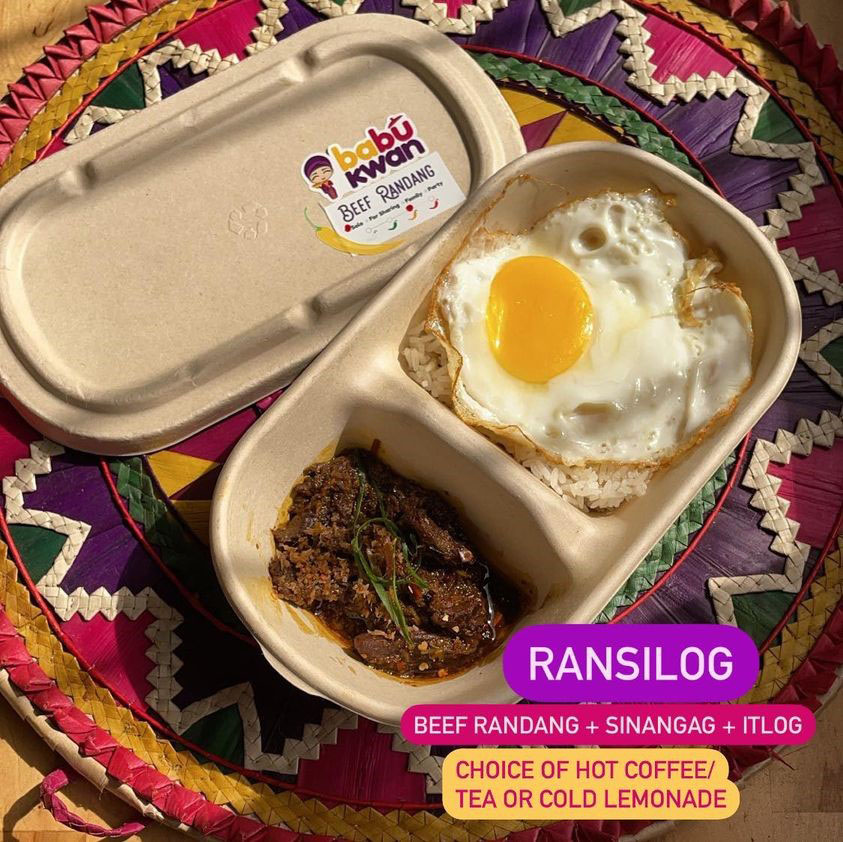ILIGAN CITY ( MindaNews / 3 February) – While the coronavirus disease 2019 (COVID-19) pandemic ravaged the global economy forcing many businesses to shutdown, Babu Kwan restaurant managed to find opportunities that kept it afloat amidst these trying times.
The first and only halal-certified restaurant in Cagayan de Oro City, Babu Kwan opened in April 2019 with the vision of promoting arts and culture. These are reflected not just in the food that they serve but also in the decoration and ambiance of the eatery. Halal is an Arabic term meaning lawful or permitted in Islam.
 Babu Kwan will not only satisfy your appetite for food, but for culture as well . The restaurant has tables similar to how Meranaws accommodate guests. It also features the Meranaw baor, a furniture where treasures and ornaments are stored, as seats. Columns are embellished with various Moro tribeÕs weaving patterns. MindaNews photo courtesy of Khal Mambuay-Campong
Babu Kwan will not only satisfy your appetite for food, but for culture as well . The restaurant has tables similar to how Meranaws accommodate guests. It also features the Meranaw baor, a furniture where treasures and ornaments are stored, as seats. Columns are embellished with various Moro tribeÕs weaving patterns. MindaNews photo courtesy of Khal Mambuay-Campong
Babu Kwan is a dream venture of the husband-and-wife tandem of Engr. Abdelnur Campong and Norkhalila Mae “Khal” Mambuay-Campong to promote Asian, Filipino and Moro cuisine fusion in the local casual dining circuit that strictly adheres to food safety standards.
Khal, the restaurant manager and in-house food safety compliance officer, completed a training on Hazard Analysis and Critical Control Points, a systematic approach to ensure food safety.
“The reason why we branded it not really as a Moro [restaurant] but an Asian [restaurant] is because we saw that most of our food [in Asia] are the same. It has a story that connects it to other neighboring Asian countries,” Khal said in an interview via Zoom.
“Babu” is a Moro term that means auntie. “Kwan,” a Filipino expression understandable anywhere in the Philippines, connotes forgetting something temporarily. Babu Kwan, Khal explained, loosely translates “to a place where people can eat halal comfort foods just like how their aunties spoil them.”
Babu Kwan has been getting good raves for their food since it opened shop almost two years ago.
Their best seller is beef rendang, which is simmered for four to eight hours in hot chili and coconut milk, and added with palapa (white scallions) to give it a Meranaw taste.
They also serve beef rendang in sandwich, dynamite sticks (in egg roll wrappers), pasta and a breakfast meal they called Ransilog (rendang, egg and garlic fried rice), fit for all ages.
Their version of Mee Goring, the Pancit a Maloya, is not for the faint-hearted —it was said to be spicier than the Korean Fire Noodles.
Babu Kwan also offers Chicken Piyaparan, chicken cooked in palapa, turmeric and coconut milk. It is an original dish of the Meranaw tribe.
The palapa they use are bought and made in Lanao del Sur, the home of the Meranaws.
They also transformed the Balolon, a Meranaw crepe filled with inti (sweetened coconut) similar to the daral of the Tausug and Iranun ethnic tribes, into a dessert in five flavors: coco-coffee, ube halaya (purple yam dessert), pandan (screwpine), durian and mango.
 Balolon is a Meranaw crepe filled with inti (sweetened coconut). Babu Kwan’s balolon is available in five flavors: coco-coffee, ube halaya (purple yam dessert), pandan (screwpine), durian and mango. MindaNews photo by RIZ P. SUNIO
Balolon is a Meranaw crepe filled with inti (sweetened coconut). Babu Kwan’s balolon is available in five flavors: coco-coffee, ube halaya (purple yam dessert), pandan (screwpine), durian and mango. MindaNews photo by RIZ P. SUNIO
Dire situation
When the lockdowns were imposed in March last year to prevent the spread of COVID-19, Babu Kwan, like other restaurants, closed its doors to dine-in customers, and bookings for birthdays and other reservations had to be cancelled.
“There were days when we only had an income of Php200. There were rare days when we received bulk orders,” Khal recalled. “Paying for our staff alone ate our profit.”
In April 2020, Babu Kwan reopened its doors for delivery.
“We opened again for delivery only because we saw the need. We thought about diners and customers who need halal food but had nowhere to buy from. We also thought of our workers,” Khal said.
Despite the difficult times, the couple, in May 2020, made four of their eight staff into regular employees, seeing their commitment to their work.
 (L to R) ) Engr. Abdelnur Campong, Aayan Campong, Vice President Leni Robredo and Khal Mambuay-Campong pose inside Babu Kwan before the COVID-19 pandemic. MindaNews photo courtesy of Khal Mambual-Campong
(L to R) ) Engr. Abdelnur Campong, Aayan Campong, Vice President Leni Robredo and Khal Mambuay-Campong pose inside Babu Kwan before the COVID-19 pandemic. MindaNews photo courtesy of Khal Mambual-Campong
Due to the difficult situation, the couple also requested the owner of the building to reduce their lease.
“Alhamdullilah, our customers saw our efforts to still operate despite the challenges, that’s why we also appreciate them… I think we have established a good customer base,” Khal said.
Blessing in disguise
While businesses were struggling, the COVID-19 lockdown was also an opportunity for Babu Kwan to recalibrate plans and involved the staff in making business decisions.
“I think it was a blessing in disguise that things slowed down a bit before we reopened. Had we continued with our usual ways, the business might have eventually failed,” Khal said.
They are now open seven days a week from 6:30 am to 7:30 pm, compared previously when they had days off.
The break was also an opportunity for Babu Kwan to make changes in their menu to avoid tiring the customers of the same offerings. During the lockdown, they started delivering one of their newest best sellers: baked sushi topped with chicken kagikit (shredded meat) of the Maguindanao tribe.
“It’s creation was not intentional. That time, we didn’t know what else to sell during the pandemic. We were lost in translation,” Khal said.
Babu Kwan also initiated to switch to eco-friendly and recyclable materials for take-out orders. Their containers are 100% biodegradable made of sugarcane bagasse and paper, and spoon and fork made of cornstarch.
 Babu KwanÕs 100% biodegradable containers are made of sugarcane bagasse. Photo from Babu Kwan Facebook page
Babu KwanÕs 100% biodegradable containers are made of sugarcane bagasse. Photo from Babu Kwan Facebook page
“We were closed, but we were still happy in the restaurant… That made us realize that it’s okay to experiment,” she added.
Forward to the new normal
To comply with the minimum health standards for COVID-19, Babu Kwan installed movable dividers at their store for physical distancing.
The maximum number of customers allowed was also reduced to 45 people at any one time.
Foods are served in cling wraps to avoid possible contamination, and contactless serving was observed.
When Babu Kwan opened again its physical store last November, Khal said that they have been getting almost the same number of customers before the pandemic, despite reducing the number of customers allowed at any one time to conform with health and safety protocols.
“Before, we were too confined [to our prevailing practices], and we learned a lot of things [during the lockdown] that we applied when we reopened. So I think we’re stronger now, our menu is more fail-proof. We rested, but we are now ready,” Khal said. (Riz P. Sunio / MindaNews)
